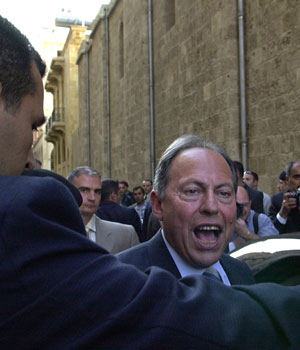
Lebanon’s President Emile Lahoud, right, flanked by his bodyguard, reacts after leaving a cabinet session in downtown Beirut, Lebanon, March 30, 2006 (AP)
BEIRUT (AFP) – Ministers from Lebanon’s anti-Syrian parliamentary majority have walked out of a cabinet meeting in protest at the presence of pro-Damascus President Emile Lahoud, in the latest political row paralyzing the country.
The ministers headed out of Thursday’s session after a verbal clash between anti-Syrian telecommunications minister Marwan Hamadeh and Lahoud, whom the parliamentary majority seeks to remove from office, an AFP correspondent said.
The walkout came shortly after majority leader Saad Hariri said that talks aimed at breaking a long-running political deadlock were close to resolving one of the most contentious issues — the fate of Lahoud.
“Solutions have actually been found to certain issues and there will soon be a solution to the issue of the Lebanese presidency,” Hariri told reporters in Cairo after meeting Egyptian President Hosni Mubarak.
The apparent meltdown also followed a public dispute between Lahoud and Prime Minister Fuad Siniora at Wednesday’s Arab summit in Khartoum over a draft resolution pledging to support Lebanese armed groups.
“We represent the majority and Siniora was our representative at the summit. His position was the legitimate one, not yours,” Hamadeh told Lahoud at the start of the cabinet session.
Interim Interior Minister Ahmad Fatfat told reporters that Lahoud also attacked him verbally during the session.
After the cabinet meeting, Lahoud told reporters that the walkout was a “comedy” and insisted that the Arab leaders had adopted his own point of view at the Khartoum summit.
“The Arabs were more concerned about Lebanon than the Lebanese,” he said.
The argument between Siniora and Lahoud in Khartoum erupted after Siniora, who took part in the meeting without sitting in the Lebanese delegation headed by his arch rival Lahoud, demanded the removal of a clause pledging support to the armed “Lebanese resistance”.
Lahoud protested Siniora’s request — which reflected concern over the right of the Shiite Muslim fundamentalist Hezbollah movement to retain its arms — leading to a vocal dispute between the two leaders.
After Thursday’s cabinet session, Hamadeh told reporters that “the walkout does not threaten the government” and will not affect the national dialogue process which resumes Monday. Lahoud is not taking part in the dialogue.
“The walkout is meant to protest what happened in Khartoum,” Hamadeh said.
Mubarak’s meeting with Hariri came only days after Mubarak met separately with Siniora and Syrian Vice President Faruq al-Shara.
Mubarak, who has long played a mediating role in the Middle East conflict, has been trying to ease tensions between Lebanon and Syria over the assassination of ex-premier Rafiq Hariri, the father of Saad Hariri.
UN reports have suggested top-level Syrian involvement in the murder, which triggered a wave of domestic and international pressure that forced Damascus to pull out its troops from its smaller neighbour in April last year.
Lebanon however remains in a deep political crisis. The roundtable talks are aimed at breaking the deadlock over Lahoud’s fate and the disarming of Hezbollah.
International and domestic outcry in the wake of Hariri’s killing in a February 2005 bomb blast led Syria to withdraw its troops after maintaining a military presence in its tiny neighbour for 29 years.

A huge banner of Rafik Hariri which reads “They feared you so they killed you” hangs in Beirut, February 2006 (AFP)

Caroline Ziade, Lebanon’s top diplomat to United Nations, left, addressed a Security Council meeting regarding the situation in the Middle East, March 30, 2006 (AP)
